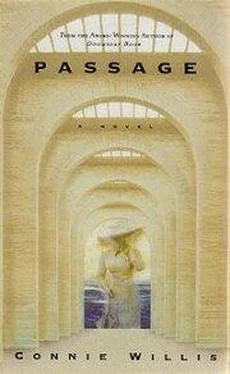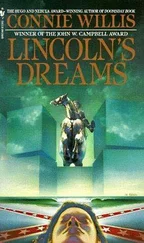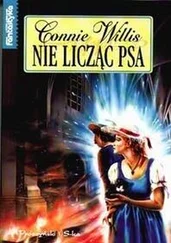She was already shaking her head. “That scene, with them standing around out on the deck, wearing nightgowns and evening clothes, wasn’t in Titanic.”
“All right, then a book or—”
“No,” she said, but less certainly, “I don’t think it was a book.”
“Or a conversation—” but she was already shaking her head.
“Not a conversation. The memory came from somewhere else.”
“Where?”
“I don’t know. You say my seeing the Titanic is determined by the random firing of a synapse—”
“And temporal-lobe stimulation.”
“But nearly all the NDEers conclude they’re seeing heaven. If random firings were determining the content, wouldn’t they be reporting a whole variety of places and experiences?”
“Not necessarily,” Richard said. “The firing of the synapses may be too weak in most cases to produce an image. Or the sense of cosmic significance may override any other images.”
“Then why didn’t it in mine?”
“Because you were on guard against those interpretations. As you said when you were trying to talk me into letting you go under, when you saw a radiant figure, you wouldn’t automatically assume it was an Angel of Light.”
“But why would I assume it was the Titanic, of all things? Why not a railroad tunnel? Just last week Vielle said, ‘What if the light at the end of the tunnel’s an oncoming train?’ And I live in Colorado. There are dozens of tunnels in the mountains. One of them would have been the logical association, not a ship. I’ve never even been on a ship.”
“You’re thinking logical explanations,” Richard said, “but these synapse firings are random—”
Joanna was shaking her head again. “It doesn’t feel random. I have this feeling that I saw the Titanic for a reason, that it means something.”
And here we are, Richard thought, right back at the temporal lobe and the sense of significance. “This feeling,” he said, “can you describe it?”
“It has to do with where the memory that triggered the image of the Titanic came from,” she said. “I have this strong feeling that I know where the memory came from, and that if I could just remember—”
“But you can’t?”
“No, it’s right…” her hand reached out, as if trying to grasp something, “…on the tip—” She stopped and yanked her hand back to her side. “You don’t think that means anything either, do you?” she said angrily. “You think it’s temporal-lobe stimulation again.”
“It would explain why you can’t remember where you got the memory,” he said mildly. “Are you having the feeling now? That you know where the memory came from?”
“Yes.”
“Get on the table,” he said, going rapidly over to the supply cabinet. “I want to see if we can catch this on the scan.” He got out a syringe.
“Do you want me to get undressed?”
“No, and I’m not going to bother with an IV, since all I’m going to inject is the marker,” Richard said, filling the syringe. “Take off your sweater and roll up your sleeve.”
Joanna took off her cardigan and got up on the table, unbuttoning the cuff of her blouse and pushing the sleeve up.
He began positioning the RIPT scan. “You had a feeling of recognition in the first three scans, and in this one you recognized the Titanic. Those two things may have nothing to do with each other.”
“What do you mean, nothing to do with each other?”
He swabbed the inside of her elbow with alcohol and injected the marker. “The feeling of recognition you experienced in the walkway and when the heater shut off may have been just that, a feeling, triggered by random stimuli, and unrelated to your recognition of the Titanic.”
“But they weren’t random,” she said, flushing. “They all fit, your lab coat and the cold and the—”
“Those could apply to any number of situations.”
“Name one,” Joanna said.
“You yourself said the people you saw could have been at a party or a ball.”
“The woman was in her nightgown!”
“You concluded it was a nightgown after you realized it was the Titanic. Earlier, you said it was an old-fashioned dress. You originally thought it was an angel’s robe. Lie down.”
“But what about the curving floor,” she said, lying down on the examining table, “and your lab coat, and—?”
“Don’t talk,” he said, moving the scan into position. He walked over to the console. “All right,” he said, starting the scan. “I want you to count to five in your head.”
He looked up at the image on the scans. “Now, I want you to visualize the tunnel. Think about what you saw.”
A number of frontal-cortex sites lit up, indicating a variety of sources for the memory, both auditory and visual, which might be why Joanna couldn’t remember whether she’d heard or read something about the engines stopping and the passengers going out on deck to see what had happened.
Or seen it in the movie, he thought. He still considered that the most likely possibility, in spite of Joanna’s protests. The movie had been an enormous hit, and for over a year it had been impossible to turn around without being bombarded with information about it—books, CDs, newspaper articles, TV specials. And a few years before that the same thing had happened with the discovery of the wreck. It was impossible not to know something about the Titanic, and Joanna obviously did. She not only knew that there’d been carpets in the first-class passageways, but that the wireless operator had been Jack Phillips. “All right, now, Joanna, concentrate on the source of the memory,” he said and looked up at the temporal-lobe area on the screen, expecting it to light up.
It did, a vivid orange-red. He asked her several more questions and then shut off the scan. “You can get up now,” he said and started graphing the scans.
Joanna came over to the console, rolling down her sleeve. “I still haven’t recorded my NDE.” She pulled on her cardigan. “I’ll be in my office.”
“Don’t you want to see your feeling of significance?” He called the scan up. “There it is,” he said, pointing to the temporal lobe. “That’s why you feel seeing the Titanic isn’t random.”
She looked at it glumly, her hands jammed in her lab coat pockets, as he showed her the areas of activity.
“But the feeling that I know where the memory came from is so strong…” she murmured.
“Like the feeling you had in the dressing room and the walkway,” Richard said.
“Yes,” she admitted.
He pointed at the red-orange temporal lobe. “Your mind is simply trying to make sense of an irrational feeling by giving it an object, in this case the source of the memory, but it’s only a feeling.”
She looked like she was going to contradict him, but all she said was, “I still haven’t recorded my account.” She picked up her recorder.
“When you write it up—”
“I know,” Joanna said. “Don’t let it fall into enemy hands.”
“Mandrake would—”
“I know,” she said. “Have a field day with this.”
She started out of the lab. At the door she turned and looked back at the scan. “I think I liked it better when you were accusing me of being Bridey Murphy,” she said ruefully and went out.
“I scorn to answer you such a question!”
—Queen Elizabeth I, on being asked on her deathbed by Sir Robert Cecil if she had seen any spirits
Richard’s wrong, Joanna thought, opening the door to her office. It isn’t a content-free feeling. The memory didn’t come from the movie, and it’s not the first thing my long-term memory happened to stumble over. It’s the Titanic for a reason.
Читать дальше












